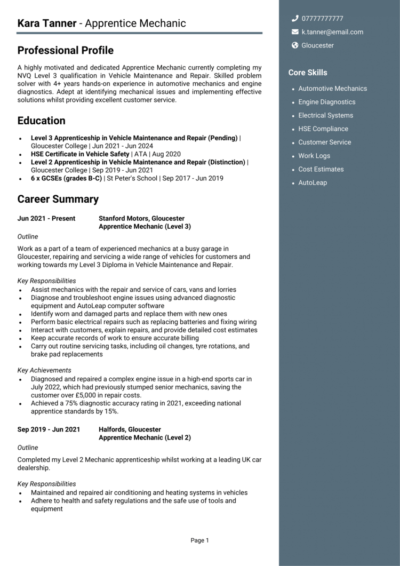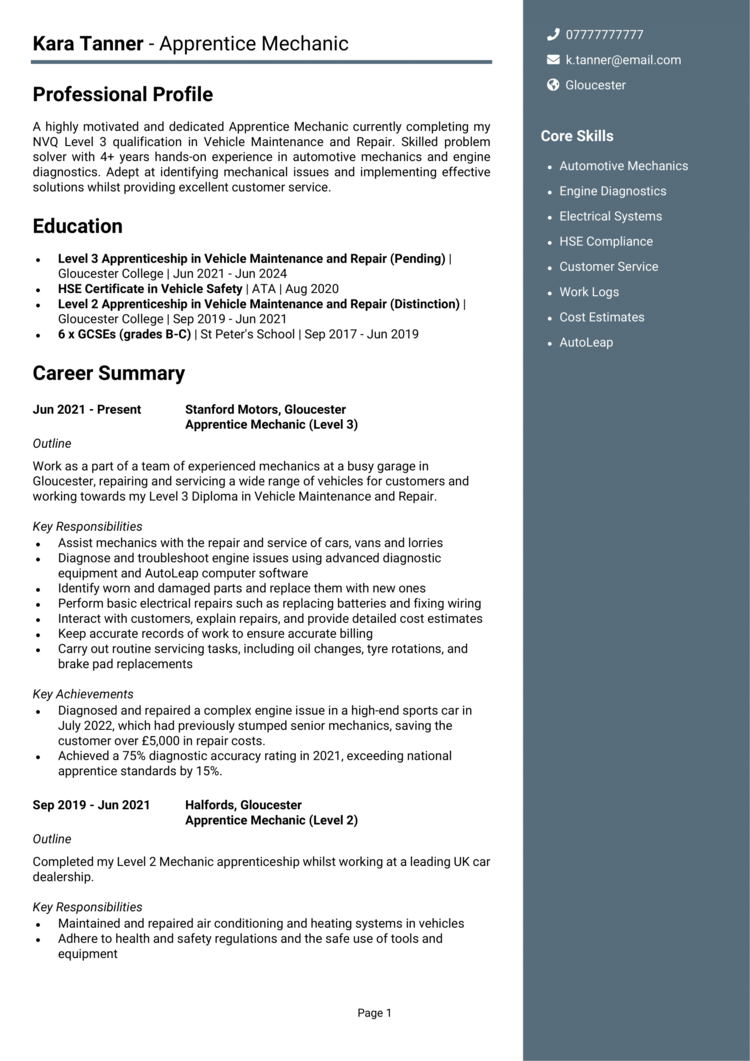Are you hoping to accelerate your career in mechanics?
An apprenticeship gives you the opportunity to strengthen your skill set and get some on-the-job experience under your belt. But first, you’ve got to land the role.
To do this, you need an impressive application and we’re going to show you how to build just that with our detailed guide and apprentice mechanic CV example below.
|
Apprentice Mechanic CV example
Before you start writing your CV, take a look at the example Apprentice Mechanic CV above to give yourself a good idea of the style and format that works best in today’s job market.
Also, take note of the type of content that is included to impress recruiters, and how the most relevant information is made prominent, to ensure it gets noticed.


Apprentice Mechanic CV format and structure
First impressions count, so a sloppy, disorganised CV may cause your CV to be overlooked..
Instead, perfect the format and structure of your CV by working to a clear logical structure and applying some simple formatting tricks to ease readability.
Don’t underestimate the importance of this step; if your CV lacks readability, your written content won’t even be seen.
Tips for formatting your Apprentice Mechanic CV
- Length: Two sides of A4 makes for the perfect CV length, though one page is okay for less experienced applicants. This forces you to make sure that every single sentence adds value to your CV and ensures you avoid unnecessary info.
- Readability: By formatting your section headings with bold or a different colour font and using bullet points to break up large blocks of text, you can help busy recruiters quickly scan through your CV. This makes it easier for them to find important details without wasting time.
- Design & format: The saying ‘less is more’ couldn’t be more applicable to CVs. Readability is key, so avoid overly complicated designs and graphics. A subtle colour palette and easy-to-read font is all you need!
- Photos: Recruiters can’t factor in appearance, gender or race into the recruitment process, so a profile photo is not usually needed. However, creative employers do like to see them, so you can choose to include one if you think it will add value to your CV .
Quick tip: Creating a professional CV style can be difficult and time-consuming when using Microsoft Word or Google Docs. To create a winning CV quickly, try our quick-and-easy CV Builder and use one of their eye-catching professional CV templates.
CV structure
To make it easy for busy recruiters and hiring managers to digest your CV, divide the content into several key sections when writing it:
- Contact details: Always list your contact details at the very top to avoid them being missed.
- Profile: Start with an introductory paragraph that catches recruiters’ attention and summarises your offerings.
- Work experience/career history: List your relevant work experience in reverse chronological order, starting with your current position.
- Education: Provide a concise summary of your education and qualifications.
- Interests and hobbies: You can include an optional section to showcase any hobbies that demonstrate transferable skills.
Now you understand the basic layout of a CV, here’s what you should include in each section of yours.
Contact Details
Start off your CV with a basic list of your contact details.
Here’s what you should include:
- Mobile number
- Email address – It’s often helpful to make a new email address, specifically for your job applications.
- Location – Share your town or city; there’s no need for a full address.
- LinkedIn profile or portfolio URL – Make sure the information on them is coherent with your CV, and that they’re up-to-date
Quick tip: Delete excessive details, such as your date of birth or marital status. Recruiters don’t need to know this much about you, so it’s best to save the space for your other CV sections.
Apprentice Mechanic CV Profile
Your CV profile is basically a short introductory paragraph, which summarises your key selling points and highlights why you’d make a good hire.
So, write a well-rounded summary of what you do, what your key skills are, and what relevant experience you have.
It needs to be short, snappy and punchy and, ultimately, entice the reader to read the rest of your CV.
How to write a good CV profile:
- Make it short and sharp: Recruiters have piles of CVs to read through and limited time to dedicate to each, so it pays to showcase your abilities in as few words as possible. 3-4 lines is ideal.
- Tailor it: The biggest CV mistake? A generic, mass-produced document which is sent out to tens of employers. If you want to land an interview, you need to tailor your CV profile (and your application as a whole) to the specific roles you’re applying for. So, before you start writing, remember to read over those job descriptions and make a list of the skills, knowledge and experience the employers are looking for.
- Don’t add an objective: Want to talk about your career goals and objectives? While the profile may seem like a good space to do so, they’re actually much better suited to your cover letter.
- Avoid generic phrases: Focus on fact, not fluff. Phrases like “Committed and enthusiastic thought-leader” and “Dynamic problem solver” might sound fancy, but they’ll do nothing for your application. Not only do they sound cheesy, but they have no substance – stick to real skills and facts
Example CV profile for Apprentice Mechanic
What to include in your Apprentice Mechanic CV profile?
- Experience overview: Showcase your aptitude for the job you are aiming for by giving a brief summary of your past work history, including the industries you have worked in, the kinds of employers you have served, and the roles you have held.
- Targeted skills: Make your most relevant Apprentice Mechanic key skills clear in your profile. These should be tailored to the specific role you’re applying for – so make sure to check the job description first, and aim to match their requirements as closely as you can.
- Important qualifications: If the jobs you are applying to require candidates to have certain qualifications, then you must add them in your profile to ensure they are seen by hiring managers.
Quick tip: If you are finding it difficult to write an attention-grabbing CV profile, choose from hundreds of pre-written profiles across all industries, and add one to your CV with one click in our quick-and-easy CV Builder. All profiles are written by recruitment experts and easily tailored to suit your unique skillset.
Core skills section
In addition to your CV profile, your core skills section provides an easily digestible snapshot of your skills – perfect for grabbing the attention of busy hiring managers.
As Apprentice Mechanic jobs might receive a huge pile of applications, this is a great way to stand out and show off your suitability for the role.
It should be made up of 2-3 columns of bullet points and be made up of skills that are highly relevant to the jobs you are targeting.
Important skills for your Apprentice Mechanic CV
Automotive Systems Knowledge – Utilising knowledge of various automotive systems, including engine, transmission, electrical, suspension, and braking systems, and their components.
Diagnostics – Utilising diagnostic tools and equipment to identify and troubleshoot mechanical issues in vehicles.
Repair and Maintenance – Performing routine maintenance tasks such as oil changes, filter replacements, and tire rotations, as well as conducting repairs on different vehicle components.
Automotive Technology – Utilising automotive technologies, such as computerised diagnostics, engine management systems, and hybrid/electric vehicle systems.
Hand and Power Tools – Safely and effectively using a wide range of hand and power tools commonly used in automotive repair and maintenance.
Safety Procedures – Utilising knowledge of workplace safety regulations and adherence to proper safety protocols to prevent accidents and maintain a safe working environment.
Documentation and Reporting – Accurately documenting repairs, maintenance tasks, and diagnostic findings, and effectively communicating them to supervisors and customers.
Problem Resolution – Analysing and troubleshooting complex mechanical issues, identifying root causes, and developing appropriate solutions.
Customer Service – Utilising strong interpersonal and communication skills to effectively interact with customers, understand their concerns, and provide quality service.
Continuous Learning – Staying updated with advancements in automotive technology, regulations, and industry standards through ongoing training and professional development.
Quick tip: Our quick-and-easy CV Builder has thousands of in-demand skills for all industries and professions, that can be added to your CV in seconds – This will save you time and ensure you get noticed by recruiters.


Work experience
By this point, employers will be keen to know more detail about you career history.
Starting with your most recent role and working backwards, create a snappy list of any relevant roles you’ve held.
This could be freelance, voluntary, part-time or temporary jobs too. Anything that’s relevant to your target role is well-worth listing!
Structuring each job
Your work experience section will be long, so it’s important to structure it in a way which helps recruiters to quickly and easily find the information they need.
Use the 3-step structure, shown in the below example, below to achieve this.
Outline
Firstly, give the reader some context by creating a punchy summary of the job as a whole.
You should mention what the purpose or goal of your role was, what team you were part of and who you reported to.
Key responsibilities
Next, write up a punchy list of your daily duties and responsibilities, using bullet points.
Wherever you can, point out how you put your hard skills and knowledge to use – especially skills which are applicable to your target role.
Key achievements
Round up each role by listing 1-3 key achievements, accomplishments or results.
Wherever possible, quantify them using hard facts and figures, as this really helps to prove your value.
Sample job description for Apprentice Mechanic CV
Outline
Work as a part of a team of experienced mechanics at a busy garage in Gloucester, repairing and servicing a wide range of vehicles for customers and working towards my Level 3 Diploma in Vehicle Maintenance and Repair.
Key Responsibilities
- Assist mechanics with the repair and service of cars, vans, and lorries
- Diagnose and troubleshoot engine issues using advanced diagnostic equipment and AutoLeap computer software
- Identify worn and damaged parts and replace them with new ones
- Perform basic electrical repairs such as replacing batteries and fixing wiring
Quick tip: Create impressive job descriptions easily in our quick-and-easy CV Builder by adding pre-written job phrases for every industry and career stage.
Education section
At the bottom of your CV is your full education section. You can list your formal academic qualifications, such as:
- Degree
- GCSE’s
- A levels
As well as any specific Apprentice Mechanic qualifications that are essential to the jobs you are applying for. Note down the name of the qualification, the organisation at which you studied, and the date of completion.
Hobbies and interests
This section is entirely optional, so you’ll have to use your own judgement to figure out if it’s worth including.
If your hobbies and interests could make you appear more suitable for your dream job, then they are definitely worth adding.
Interests which are related to the industry, or hobbies like sports teams or volunteering, which display valuable transferable skills might be worth including.


When putting together your Apprentice Mechanic CV, there are a few key points to remember
Always tailor your CV to the target role, even if it means creating several versions for different roles.
Additionally, remember that the structure and format of your CV needs just as much attention as the content.
Good luck with your job search!










